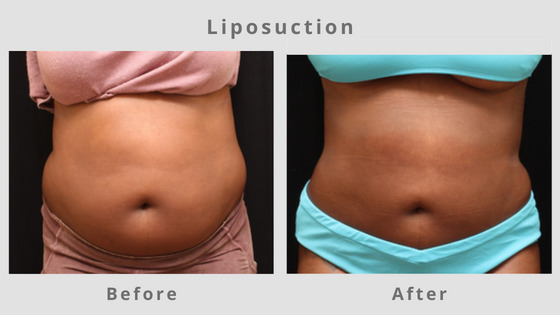Liposuction vs. Bariatric Surgery
Embarking on a journey toward a healthy weight is the first step in regaining your well-being. Breaking free from obesity can drastically reduce your risk of developing life-threatening conditions like heart disease and high cholesterol. However, determining the weight loss approach that best suits your needs can be confusing and overwhelming.
Dr. George Woodman is committed to helping you fully understand your condition and your options so that you can make knowledgeable decisions that lead to sustainable weight management solutions. Regularly, patients ask our team to explain the difference between bariatric surgery and liposuction.
Liposuction is typically not suitable for individuals who are obese or seeking a treatment for obesity. Bariatric surgery modifies the digestive system, leading to dramatic weight loss. Outpatient liposuction typically removes 2 to 8 pounds of fat, while bariatric surgeries result in more substantial weight loss.
While these procedures are sometimes perceived as similar, they are totally unrelated in their purpose and effect on one’s health. Liposuction has no effect on someone’s weight and does nothing to help alter one’s lifestyle.

Liposuction focuses on the temporary removal of superficial fat deposits, while bariatric surgery helps to change how the body reacts to its environment and nutritional intake. Because of this, bariatric surgery can spur weight loss that involves not only aesthetic transformation but also the alleviation of the various health risks associated with obesity.
Bariatric surgery affects and reduces the entire body’s fat stores therefore drastically reducing a person’s weight while improving one’s overall health and appearance whereas superficial liposuction has no effect on the majority of a person’s fat stores and does nothing to affect their health or absolute weight.
What Exactly is Liposuction?
During liposuction, fat deposits are removed by a plastic surgeon or dermatologist using a vacuum-like instrument or ultrasonic probe. The Food and Drug Administration describes liposuction as “a body-shaping procedure not recommended for medical weight loss.”

Typically, patients experiencing an ongoing battle with excess weight do not permanently benefit from liposuction, as the factors contributing to weight gain remain just as potent post-procedure as they were before.
What is Bariatric Surgery?
Unlike liposuction, bariatric surgery’s primary goal is not to make temporary aesthetic changes but to alter how the body responds to specific factors that trigger excess weight. Bariatric procedures supplement lifestyle changes to make significant weight loss and preserving a healthy weight possible for overweight men and women.
For patients who have struggled with persistent obesity, bariatric surgery is a more viable option than liposuction. Bariatric surgery can greatly lessen the likelihood of encountering weight-related health problems by interceding in the processes that lead to stubborn excess weight. It can also curb the likelihood of immediately gaining all of your excess weight back post-procedure. For patients who have struggled with persistent obesity, bariatric surgery is typically a more viable option than liposuction. Bariatric surgery can greatly lessen the likelihood of encountering weight-related health problems by interceding in the processes that lead to stubborn excess weight. It can also curb the likelihood of immediately gaining all of your excess weight back post-procedure.

The benefits of bariatric surgery include:
- Significant Weight Loss: While liposuction partially removes superficial fat deposits, bariatric surgery affects your entire body and helps you to keep off excess weight.
- Improved Health: Bariatric surgery can slash the risk of weight-related disorders like diabetes, heart disease, sleep apnea, high blood pressure, and spinal complications for obese individuals. Remarkably, it can alleviate or even eradicate these conditions in those already afflicted. This intervention offers an avenue for obese individuals to reclaim their health, mitigate the severity of these ailments, and potentially eliminate them.
- Mental Stability: Bariatric surgery can potentially help diminish the impact of depression, anxiety, and excessive fatigue. This evidence-based procedure addresses the underlying physiological factors associated with these conditions and promotes overall well-being.
- Better Quality of Life: Through bariatric surgery, patients can reclaim the lives they’ve lost to excess weight. Often, men and women return to activities they had become incapable of performing or try new things they’ve always felt hindered from attempting, such as hiking, cycling, coaching their child’s sports team, or even traveling extensively.
Common Misconceptions
When considering weight loss solutions, a sea of misinformation and common misconceptions often cloud decision-making. Here, we aim to clarify some of the most prevalent misunderstandings about bariatric surgery and liposuction to help you make informed choices.
Misconception 1: Liposuction is a quick fix for obesity.
Many believe liposuction is a shortcut to significant weight loss. However, liposuction is a cosmetic procedure designed to contour the body by removing small amounts of superficial fat from specific areas. It is not a solution for obesity or a substitute for traditional weight loss methods such as diet and exercise. The procedure is best suited for individuals close to their ideal body weight, looking to eliminate stubborn fat deposits that don’t respond to lifestyle changes.
Misconception 2: Bariatric surgery is overly risky and should be a last resort.
While all surgical procedures carry risk, bariatric surgery has been proven to be safe and effective, with a complication rate lower than that of many other common surgeries. The benefits of bariatric surgery—such as significant and sustained weight loss, improvement or resolution of diabetes, and lower risk of heart disease—often far outweigh the potential risks. It’s not merely a “last resort” but a viable option for those who have struggled with obesity and related health conditions despite making lifestyle changes. Bariatric surgery is best performed by surgeons who dedicate the majority of their time to this specific endeavor, rather than those that perform few procedures.
Misconception 3: Bariatric surgery guarantees permanent weight loss without effort.
Bariatric surgery is a powerful tool for weight loss, but it’s not a magical solution. Successful outcomes depend on the patient’s commitment to maintaining a healthy lifestyle, including a balanced diet and regular physical activity. Post-surgery, patients often receive support from healthcare professionals to adapt to new eating habits and lifestyle changes essential for long-term success.
Misconception 4: You will have to be on a restrictive diet forever after bariatric surgery.
While permanent dietary changes are necessary after bariatric surgery to ensure proper nutrition and maximize weight loss, these changes are not as restrictive as some might fear. With the guidance of nutritionists and dietitians, patients learn how to enjoy a wide variety of foods in moderation, focusing on nutrient-dense options to keep them full and satisfied.
Misconception 5: Liposuction and bariatric surgery are interchangeable.
These two procedures serve very different purposes. Liposuction is cosmetic, targeting specific areas for fat removal without addressing the patient’s overall weight or health. In contrast, bariatric surgery is a medical intervention aimed at significantly reducing body weight, improving or resolving obesity-related health conditions, and enhancing quality of life.
Statistical Evidence
Bariatric surgery has demonstrated significant long-term success in weight loss and improving obesity-related health conditions, supported by various clinical studies and systematic reviews.
Long-term Weight Loss
A meta-analysis and systematic review focusing on outcomes after bariatric surgery highlighted the effectiveness of these procedures over long periods. Specifically, a 20-year follow-up after Laparoscopic Adjustable Gastric Banding (LAGB) showed a substantial weight loss of 30.1 kg and 22.2% total weight loss (TWL).
Sustained Results
Clinical studies have consistently shown that most bariatric surgery patients experience rapid weight loss initially, which continues until 18 to 24 months post-procedure. It’s reported that patients may lose 30 to 50 percent of their excess weight in the first six months and up to 77 percent as early as 12 months after surgery. Moreover, many patients can maintain a 50 to 60 percent excess weight loss 10 to 14 years after surgery.
Improvement of Obesity-related Health Conditions
Bariatric surgery is highly effective in improving and even resolving many obesity-related health conditions. For instance, nearly 70 to 80 percent of patients with high blood pressure can stop taking all medications and achieve normal blood pressure levels within six months post-surgery. About 90 percent of patients with Type 2 diabetes experience significant improvements, including the reduction or complete discontinuation of all diabetes medications and normalization of blood sugar levels. These improvements suggest a potential reduction in the risk of dying from heart disease, especially for severely obese patients.
Q&A: Bariatric Surgery vs. Liposuction
Q: Am I a good candidate for bariatric surgery?
A: Ideal candidates for bariatric surgery are individuals with a Body Mass Index (BMI) of 35 or higher or those with a BMI of 30 or higher accompanied by serious health issues related to obesity, such as type 2 diabetes or high blood pressure. Commitment to long-term lifestyle changes is also crucial for the success of bariatric surgery.
Q: How much weight can I expect to lose with bariatric surgery?
A: Weight loss varies depending on the type of surgery and the individual’s lifestyle changes. On average, patients can lose 30 to 50 percent of their excess weight in the first six months, reaching up to 77 percent as early as 12 months post-surgery. Long-term studies show that many maintain a 50 to 60 percent excess weight loss 10 to 14 years after surgery.
Q: Is liposuction a suitable procedure for weight loss?
A: No, liposuction is not a weight loss solution. It is designed to remove localized fat deposits from areas like the abdomen, thighs, and arms, helping to contour and shape the body. It’s most suitable for individuals close to their ideal body weight but struggle with stubborn fat areas that do not respond to diet and exercise.
Q: What are the risks associated with liposuction?
A: Risks include contour irregularities, numbness, fluid accumulation, and more severe risks such as internal organ puncture, fat embolism, and complications related to anesthesia. The risk of complications increases with the volume of fat removed and the number of areas treated in one session.
Q: Can bariatric surgery improve health conditions associated with obesity?
A: Yes, bariatric surgery has been shown to improve or even resolve many obesity-related health conditions, such as type 2 diabetes, high blood pressure, sleep apnea, and more. Approximately 90 percent of patients with type 2 diabetes achieve excellent results, and 70 to 80 percent of patients can stop taking all medications for high blood pressure within six months post-surgery.
Q: How long is the recovery period after liposuction?
A: Recovery varies; most people can return to work within a few days and resume normal activities, including exercise, after a few weeks. Swelling and bruising are common post-surgery, and the final results may take a few months to stabilize as the body adjusts.
Q: How do I maintain the results of liposuction?
A: Maintaining a stable weight through a healthy diet and regular exercise is key to preserving the results of liposuction. Significant weight gain can alter the outcome as the remaining fat cells expand.
Q: What is the success rate of bariatric surgery?
A: The success of bariatric surgery is often defined as achieving a 50 percent or more loss of excess body weight and maintaining that level for at least five years. Clinical data show that most patients lose weight rapidly until 18 to 24 months post-surgery and can maintain a 50 to 60 percent excess weight loss 10 to 14 years after surgery.
Take the First Step Today
If you’re considering bariatric surgery and have more questions about its advantages over cosmetic procedures such as liposuction, call our team of weight loss experts at (901) 869-2000 or fill out the form on our Contact Us page. We are dedicated to helping you reach your health and weight goals safely and sustainably so that you can fully pursue the life you love!
